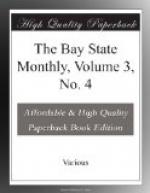“What a magnificent view!” he exclaimed, as we came to the place.
Certainly it could not be finer. We stood upon an elevated plateau, from which the prospect in either direction was beautiful and grand. To the north could be seen the graceful curves of the Green Mountain range, gradually growing fainter and of paler blue as the eye followed them to at least seventy miles away.
Farther to the east rose the majestic form of Monadnock, if not the highest, one of the very noblest peaks in the Granite State. In an opposite direction, and nearly one hundred miles from Monadnock, stood old Greylock, the greatest elevation in Massachusetts; while much nearer by—in fact, seeming almost at our feet when compared with these immense ranges—lay the charming Deerfield valley, up from which rose the curling smoke of the locomotive as it moved steadily westward, until hidden from view by a sudden entrance into Hoosac Tunnel.
The view so absorbed our attention for a time that we hardly noticed our immediate surroundings. When we did so we began to make an examination. Gault, with characteristic curiosity, began a search in the bottom of the old cellar. Suddenly he emerged.
“A veritable relic!” he exclaimed. “See! an old knife; and here on its handle is a name. Can you read it?” and he handed it to me.
A minute’s brisk scouring made it quite plain.
“I have it now,” I said. “It is Samuel Wickham.”
As I read the inscription I was startled to see the color almost instantly leave Gault’s face.
“Samuel Wickham! You don’t mean It. Let me see,” and he grasped the knife from my hand.
“It is. You are right,” he said. “You do not understand my interest in this matter,” he added, evidently a little embarrassed at his own manner. “It was the name that struck me. Probably this knife belonged to the unfortunate stranger,” and he put it carefully in his pocket.
“Do you know just when the house was burned,—did Mr. Thompson say?” he inquired, trying hard to control his excitement.
“Not exactly,” I replied; “but he told me that he had a record somewhere. You could probably ascertain from him.”
The next morning I went trouting alone, and did not return to the house until afternoon. When I did so I found a note awaiting me.
It proved to be from my friend, and said that for special reasons he had decided to return to the city that day. He was sorry not to see me again, but hoped to do so before long. I, in turn, was quite anxious to meet him again, and learn why he had returned so unexpectedly, and to know the cause of his singular manner upon finding the rusty knife. The two events were naturally connected in my mind, and also our previous conversation when he had shown me the picture of the young lady.
Three weeks later I was in Boston, and almost at once visited Mr. Gault’s office at No.—Water street. To my disappointment, I learned that he had just taken passage for England.




